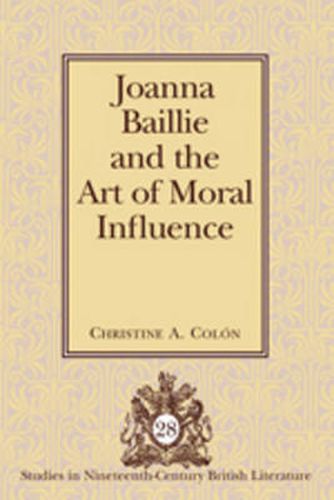Readings Newsletter
Become a Readings Member to make your shopping experience even easier.
Sign in or sign up for free!
You’re not far away from qualifying for FREE standard shipping within Australia
You’ve qualified for FREE standard shipping within Australia
The cart is loading…






Joanna Baillie and the Art of Moral Influence explores the project of moral reform that Baillie sets out for herself in the Introductory Discourse to her first volume of Plays on the Passions (1798). It begins by revealing the foundation that Baillie creates for her project as she combines her own unique theology with eighteenth-century moral philosophy and seventeenth- and eighteenth-century discourses on the theatre’s potential to reform audiences. This book argues that Baillie uses this eclectic mix to craft a potentially radical social critique in the midst of a seemingly conservative moral project. Using examples from fifteen of her plays as well as from her prefaces and her religious tract, the book traces Baillie’s moral project from its direct representations in De Monfort and Henriquez through its dangerous complexities in plays such as Orra and The Trial to its conflict with domestic ideology as an alternative means of reform in plays such as The Dream, Ethwald, The Phantom, and Witchcraft. This analysis of Baillie’s project reveals how she ultimately overcomes the difficulties inherent in her project by asking her audiences to take responsibility for their moral reform rather than relying upon the domestic woman to change society and by asking her audiences to ground their interpretations in the basic truths of Christianity. Understanding Baillie’s moral project and the discourses that influenced it and then seeing how it is enacted throughout her plays will allow teachers and scholars to appreciate even more fully the complexities of this British Romantic playwright.
$9.00 standard shipping within Australia
FREE standard shipping within Australia for orders over $100.00
Express & International shipping calculated at checkout
Joanna Baillie and the Art of Moral Influence explores the project of moral reform that Baillie sets out for herself in the Introductory Discourse to her first volume of Plays on the Passions (1798). It begins by revealing the foundation that Baillie creates for her project as she combines her own unique theology with eighteenth-century moral philosophy and seventeenth- and eighteenth-century discourses on the theatre’s potential to reform audiences. This book argues that Baillie uses this eclectic mix to craft a potentially radical social critique in the midst of a seemingly conservative moral project. Using examples from fifteen of her plays as well as from her prefaces and her religious tract, the book traces Baillie’s moral project from its direct representations in De Monfort and Henriquez through its dangerous complexities in plays such as Orra and The Trial to its conflict with domestic ideology as an alternative means of reform in plays such as The Dream, Ethwald, The Phantom, and Witchcraft. This analysis of Baillie’s project reveals how she ultimately overcomes the difficulties inherent in her project by asking her audiences to take responsibility for their moral reform rather than relying upon the domestic woman to change society and by asking her audiences to ground their interpretations in the basic truths of Christianity. Understanding Baillie’s moral project and the discourses that influenced it and then seeing how it is enacted throughout her plays will allow teachers and scholars to appreciate even more fully the complexities of this British Romantic playwright.